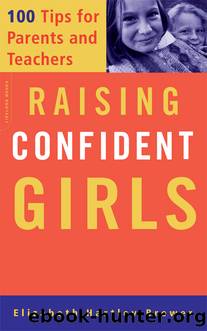Raising Confident Girls by Elizabeth Hartley-Brewer

Author:Elizabeth Hartley-Brewer [Hartley-Brewer, Elizabeth]
Language: eng
Format: epub
ISBN: 9780786724215
Publisher: Hachette Books
CHAPTER 6
Responding Sensitively to Setbacks
Life presents everyone, including children, with experiences that can knock them for a loop. It is part of every schoolâs and caregiverâs job to prepare the girls they take care of for these troublesome times. Being bullied or excluded from groups, families breaking up, friendships ending, bereavement or separations, and disappointments at school or on the sports field are common experiences. Children canât be protected from every possible hurt, however much parents may wish to and however desirable this isâand it may not be. But how can adults help to rebuild a girlâs self-esteem when all she wants to do is run away and hide?
Most of us know a child who seems to be made of rubber and wears a permanent grin. Nothing seems to get her down. Whatever the problem, she has the ability to take the knocks, keep her attention fixed on a better future, and make her way steadily, knowingly and confidently toward it. Such a girl is called resilient. She lives with and through problems, gets herself back on course, can move on and even use setbacks to strengthen and enrich herself.
Recovery from troubles is more likely when adults respond sensitively to a girlâs setbacks. When they manage her confusion and dejection well, she retains self-respect and self-esteem to face the world again and treat the obstacle as an opportunity to grow and learn.
Resilience is sometimes described as the ability to bounce back; however, this misrepresents what happens. Staying power involves action, not reaction. People with stamina and persistence think, feel, perceive and understand themselves and their situation in a way that enables them to remain positive, active and able to recognize the lessons to be learned. Resilient girls overcome problems and recover from obstacles by using a variety of skills, attributes and strategies, often helped by adults.
What gives girls staying power? Recent studies of children who recover from setbacks show that personality plays a small part, but more helpful factors are a tendency to see themselves in a good light, having at least one good, close relationship with an adult, and not being exposed to too many problems.
Girls who bounce back have a good sense of their own worth and abilities, believe they can shape what happens to them, are good at solving problems, mix happily with others, maintain friendships and are generally optimistic about life. Parents and teachers can help girls by encouraging this and by responding sensitively to them.
Download
This site does not store any files on its server. We only index and link to content provided by other sites. Please contact the content providers to delete copyright contents if any and email us, we'll remove relevant links or contents immediately.
| Early Childhood | Parenting Boys |
| Parenting Girls | School-Age Children |
| Single Parents | Teenagers |
The Lost Art of Listening by Michael P. Nichols(7497)
Rich Dad Poor Dad by Robert T. Kiyosaki(6613)
We Need to Talk by Celeste Headlee(5608)
I Love You But I Don't Trust You by Mira Kirshenbaum(3868)
The Complete Idiot's Guide to Coping With Difficult People by Arlene Uhl(3145)
Rich Dad Poor Dad: What The Rich Teach Their Kids About Money - That The Poor And Middle Class Do Not! by Robert T. Kiyosaki(2955)
A Burst of Light by Audre Lorde(2598)
The Book You Wish Your Parents Had Read (and Your Children Will Be Glad That You Did) by Philippa Perry(2520)
Dealing with People You Can't Stand by Dr. Rick Brinkman(2458)
Life Hacks by Dan Marshall(2451)
An Odyssey by Daniel Mendelsohn(2305)
The Expectant Father by Armin A. Brott & Jennifer Ash(2270)
Teach Your Child How to Think by Edward De Bono(2156)
No Time to Say Goodbye(2114)
The 7 Habits Of Highly Effective Teens by Covey Sean(2078)
What I Need by J. Daniels(2076)
The Out-of-Sync Child by Carol Stock Kranowitz(2053)
The Anxious Generation by Jonathan Haidt(2035)
I Don't Belong to You by Keke Palmer(1998)
